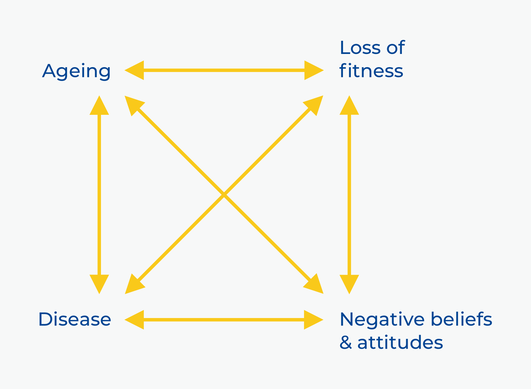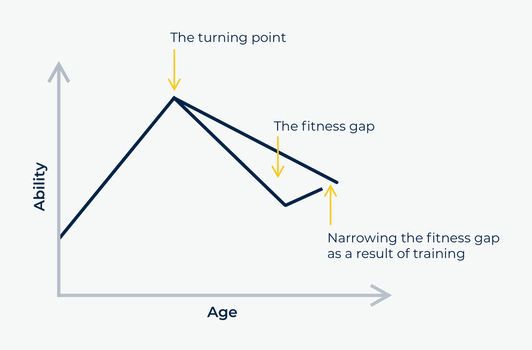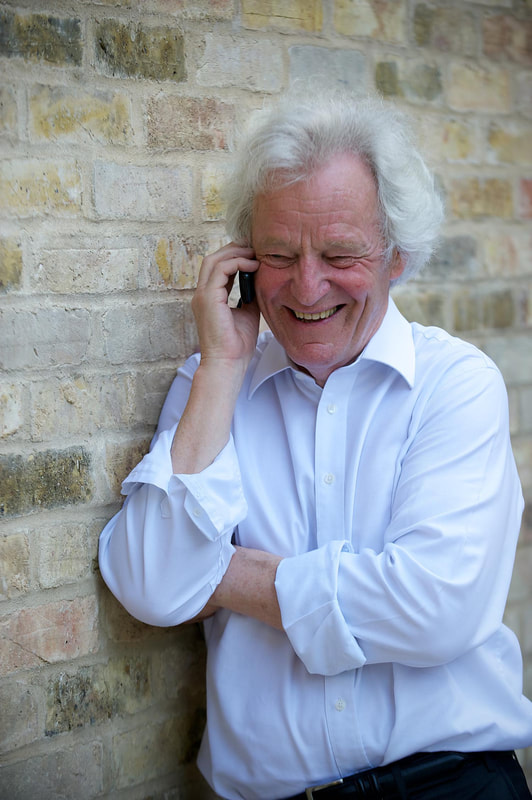Our mission and goals.Our mission is to provide learning opportunities for people who are living longer, those people who provide support, as professionals, as volunteers or as family members, and for those people who have to lead the revolution from where we are now, believing that everything is due to ageing and therefore immutable, to a society in which it is accepted that people can maintain and improve wellbeing at any age.
|
The scientific foundation of Live Longer BetterThe ageing process affects everyone from about the age of forty. But by itself it does not cause major problems until the late nineties. We now know that there are three inter-related causes of the problems that offer more frequently as people live longer:
The evidence base for Live Longer BetterWe also know what can be done to live better for longer. The evidence is strong that at any age individuals who are living longer need to focus on:
|
Focused on coachingWe are not just an information service, although the advice is based on the best current scientific evidence. There is a growing understanding of the need for new thinking about population ageing both for individuals and for society. The shift in focus is from life expectancy to health life expectancy, or to put it another way from lifespan to healthspan, although it is still essential to remember the huge difference in life span between people from the wealthiest and the most deprived subgroups of the population. The other significant shift is from ‘care’ where that implies merely doing things for people who can no longer do those things fo themselves to a new culture of enabling them to regain the ability to do those things, a culture of enablement. Indeed there is much to be learned from the culture of coaching where the mission of the coach is to support people in closing the gap between potential and performance. We are a learning programme for people living longer, for their supporters and enablers, both professional and voluntary and for the leadership of all the organisations involved in population ageing.
|
Activity is keyActivity, physical, mental and social, or, to put it another way, physical, cognitive and emotional is of vital importance in achieving optimal ageing, that is, to keep the gap between your actual level of ability and your best possible level of ability by preventing loss of fitness or regaining lost fitness, both physical and mental by what we have called ‘training’ but could just as well be called activity, particularly activity that challenges body brain and mind.
The benefits of physical activity is obvious. Mental activity increases your ability to think clearly and logically, increasing cognitive fitness and social activity will help emotional fitness, not just feeling better because people have done something nice for you but because you have done something good for other people. These are simple principles based on strong scientific but we live in a society in which many people, including highly trained people, are ignorant or confused about what is going on and how to cope with it.
|
The optimal ageing revolutionIt is important to emphasise that what happens to you as you live longer is not always your fault, neither is it all caused by the normal biological ageing process. There are environmental pressures. The world in which we live is a dangerous place, with many factors, social and physical, from low income to air pollution, causing the problems that surface as the decade's pass. As well as offering coaching to individuals we want to change the way society, and the health and social services, think about ageing and growing older. We need to change the environment, both physical and social, and our social objectives are:
|
Muir Gray
|
|
Muir Gray entered the Public Health Service by joining the City of Oxford Health Department in 1972 after qualifying in medicine in Glasgow, the city of his birth.
The first phase of his professional career focused on disease prevention, for example on helping people stop smoking. He also developed a local, then national programme of work to promote health in old age. Based on work in Oxford he developed a number of national initiatives, particularly designed to prevent hospital admission and facilitate hospital discharge, including the prevention of hypothermia, publishing a Fabian Society report on the relationship between housing and poverty and the excess winter deaths, that took place in the United Kingdom. He was also the Secretary of ASH Action on Smoking and Health. In 1975 he published articles on the effects of isolation, titled Brainwashing in Oxfordshire. and in the 1980s he published a number of key books and articles including the first book on Prevention of Disease in the Elderly and in an article in the BMJ he described the fitness gap for the first time. He also challenged the conventional wisdom, that all older people need was "care' ie things done for them. This was in an article in the Lancet titled Do We 'Care' too much for our Elders? Then he developed all the screening programmes in the NHS, for pregnant women, children, adults and older people for example offering managed sixty five screening for abdominal aortic aneurysm and, for both men and women, screening for colorectal cancer. From 1990 on he had other responsibilities, notably being the Regional Director of Public Health and Director of the National Screening Service but maintained his interest in population ageing and in the provision of best current knowledge and evidence to the public, for example, setting up NHS Choices and the One You programme www.nhs.uk/oneyou now part of www.nhs.uk Working on the principle that the delivery of clean clear knowledge was analogous to the provision of clean clear water he saw the organisation and delivery of knowledge as a public health service He launched up the Centre for Evidence Based Medicine in Oxford and was the first secretary of the Cochrane Collaboration. During this period he was appointed as the Chief Knowledge Officer of the NHS and was awarded both a CBE and later a Knighthood for services for the NHS. He set up charities to promote urban walking and an Oxford-based Centre for Sustainable Healthcare. He is worked with both NHS England and Public Health England to bring about a transformation of care with the aim of increasing value for both populations and individuals launching the NHS Atlases of Variation. He set up the Centre for Sustainable Healthcare and Better Value Healthcare and has published a series of How To Handbooks, for example, How `to Get Better Value Healthcare, How To Build Healthcare Systems and How To Create the Right Healthcare Culture. This is now a Social Enterprise – the Oxford Centre for Triple Value Healthcare. He was the principal expert adviser to the European Union in the production of their report on Value Based Healthcare in 2019. His mission, of fifty years, is how to help people live longer better is ageing and how to cope with it and he has published a book for people aged seventy called Sod 70 ! one for the younger decade, with Claire Parker, called Sod60!, and, with the Green Goddess Diana Mora, Sod Sitting, Get Moving and a book on diet – Sod It, Eat Well! Based on his research and experience he has developed a new paradigm to help people Live Longer Better, to compress morbidity at the end of life and to reduce the incidence of dementia and frailty and therefore reduce the need for social care. This is based on the new Optimal Ageing Programme at Oxford and in the National Network, now covering more than 20 million of the population and using the systems methodology, and the need for culture change, developed while setting up and running the national screening programmes. He is married, having met his wife in an old people's home when she was a social worker and has two daughters. The core Optimal Ageing team represents the populations in their 50s, 60s, 70s and the 80s and 90s. Working alongside Muir are:
So let's get going. The revolution starts here. |


